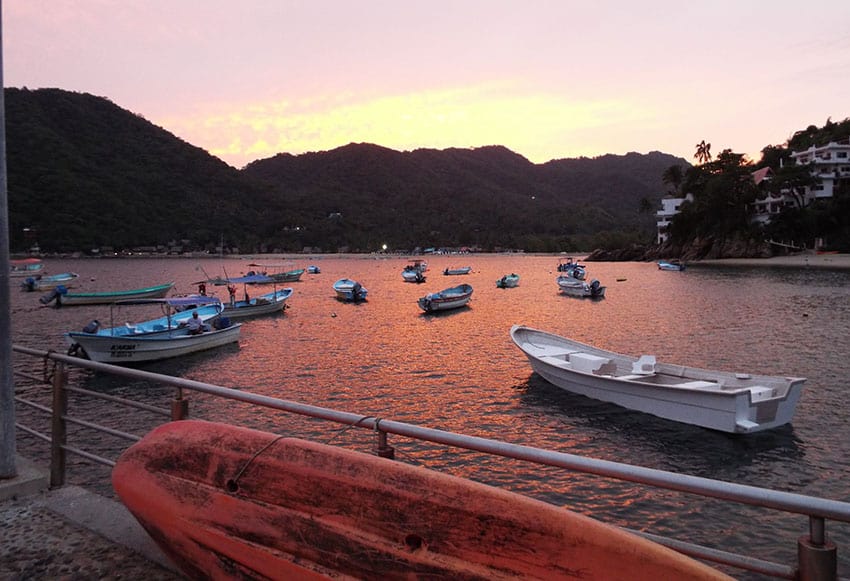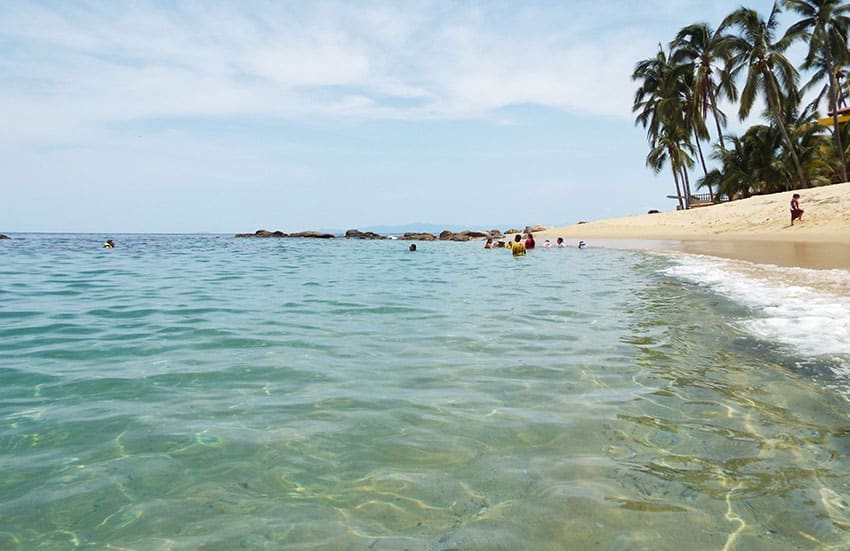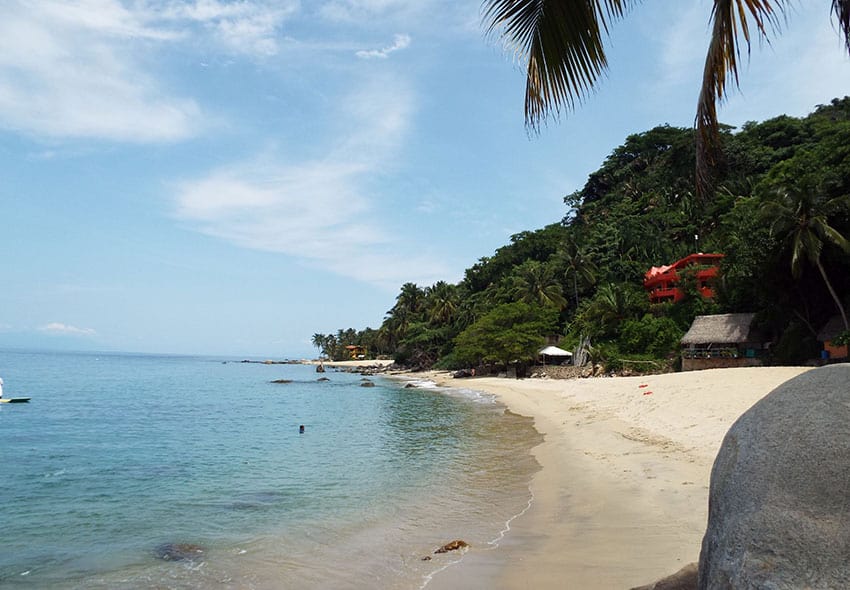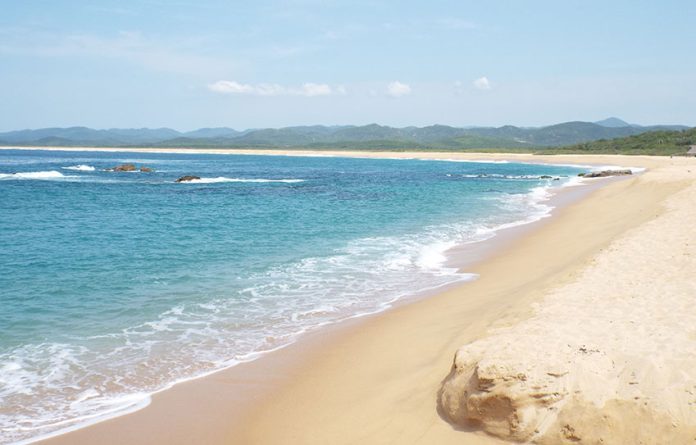When director John Huston came to film The Night of the Iguana in 1963, Puerto Vallarta was just a sleepy little fishing village. A little Hollywood glamour, provided by the famous cast and scandalous and media-drenched affair between Elizabeth Taylor and Richard Burton, and this little pueblo suddenly became an international beach hideaway for starlets and regular folks alike.
Palm-lined beaches, turquoise waters, brown sugar sand and a sultry year-round climate — there’s a lot to love in Puerto Vallarta.
Unbeknownst to a lot of travelers that beach-hop north – to the beaches of Punta Mita, Sayulita and San Francisco – Puerto Vallarta’s southern shores are dotted with delicious little inlets and a handful of quaint towns that boast some of the coast’s most beautiful beaches. It takes a little effort to get to these off-the-beaten track expanses of sand, but I think you’ll find it worth it once you arrive.
From Boca de Tomatlán to Yelapa
The road south out of central Puerto Vallarta is a jungle-lined trek past luxury hotels, public beach accesses and a half-dozen, half-built dream houses. Despite the constant construction, a dense fog of humidity and heat permeates everything, slowing even the most ambitious projects and most energetic tourists.
Along this road you’ll pass the now-closed Night of the Iguana hotel, and several exclusive housing developments in pre-sale before you reach the highway entrance to Boca de Tomatlán, a small village about 30 minutes down the coast. Whether you go by bus or by cab, it’s easy to find the town’s boat dock as you enter Boca’s small handful of streets. This is one of the bigger towns along this stretch of coast and the take-off point for the boat that takes you down the shoreline.
You’ll see handfuls of locals and Mexican tourists waiting for the next water taxi to set out. Boats to Yelapa leave every hour on the hour starting at 8:00am with an additional final boat at 6:30pm. Sounds prompt, but everything here is variable, so arrive with sunscreen and patience. The Yelapa taxi will drop you off at any of the beaches between Boca and Yelapa (about a 40-minute ride) but you have to ask the boat’s captain in advance.
Alternatively you can ask around to see which boats are going to the specific beach you want and you can often find someone leaving sooner and getting you there faster. There is a single walking path that will take you overland to both Animas beach and Quixmo beach but it is a long and hot walk. The boats are infinitely faster and more enjoyable. In the case of the water taxi you pay when you get off; a private boat ride requires you to set a price in advance.
I suggest riding the entire way to Yelapa to take a look at the beaches as you decide what suits your fancy. There is a first tiny, rocky-edged beach called Madagascar as you pass a palapa “house” on the edge of a cliff heading out from Boca. There is nothing here as far as amenities and not much shade, but it is an isolated pinpoint of a beach to drop anchor and swim for a bit.
A little farther down and you will see a short, palm-lined strip of beach that is absolutely lovely called El Caballo. This has little human presence to speak of although there are a few hotels on either end tucked up into the mountainside. Just past the rocky outcrop at the end of Caballo is Animas beach. Animas has a decent strip of beach and a long dock in the center.
This a popular beach for tourists because there are a couple of dozen restaurants that sit between the sand and the jungle backdrop. The water is nice but not as crystal clear and gorgeous blue as some of the others.

The next big beach is Quimixto, which you will recognize by the terracotta-roofed house that sits to one edge, almost in the water. This is a splendid beach for an afternoon, and many locals told me it was their favorite. There are a handful of restaurants and hotels but much fewer than at Animas.
Next is Caletas, which is the home to the Ritmo de Noches show put on by Vallarta Adventures at night. This was also the once home of director John Huston and the beach is absolutely adorable, even though there are just a few hotels and no restaurants open to the public. Majahuitas beach (the next down) is similar in that there are a few hotels but not much with open arms to the public. Still the beach is delicious and small.
Yelapa is next up, with an ample beach to one side of the town, home to about 1,500 people. Several restaurants, including the most famous, Fanny’s, sit center-stage on the beach and boats bob in the water near the town dock as many of the locals you see working in this area either live here or in Boca. Yelapa is a nice town to make your base if you’re comfortable depending on water taxis for transportation or paying exorbitant rates for private boats (someone quoted me US $70 an hour for a private ride).
The town has some nice hotels including Hotel Lagunita, Casa Pericos and others that sit along the edges of Yelapa’s tiny bay. The rock outcropping to the south end of the bay down the little coast to Playa Isabella has nice snorkeling.
Yelapa to Chimo
Twice daily from Yelapa runs a taxi that heads farther south down the coast to Chimo beach, about 30 minutes away. Again, beware of trusting timetables too much and always be early and prepare to wait. Catch the morning taxi to head to La Manzanilla, a minuscule beach that glitters like a jewel just 10 minutes down the coast by boat. There’s nothing there to distract from the beauty of the crystal-clear water but a shady palapa for picnics.

From Manzanilla you can walk south over the rocks (watch out for iguanas!) to the next beach ingeniously called Playa del Medio, or beach in the middle. This is another gorgeous little gem, and quiet, unless there is a rowdy yacht parked just off the coast like the day I was there.
From Playa del Medio you can walk along a cement path to Pizota, a small fishing village at the farthest end of this strip of beaches. Pizota has that same lovely water, but the beach is scattered with locals’ kayaks and canoes and the water with taxis and fishing boats. Most days you will have a little audience if you want to swim there as the local boat operators hang out in the shade near the edge of the beach, gabbing and drinking beers.
Pizota is a regular stop on the Chimo taxi’s route, but be sure to ask the taxi captain and not the locals what time they will be coming through – answers varied wildly and I ended up missing it altogether. There is a small convenience store on the edge of beach with some surly women running it – a fine place if you need to get a beer or water or snacks.
Inland and then out again
Too far to go by water (unless you have your own boat) there are a handful of places farther south, what is commonly called Costa Alegre, that I think you should know about.
Mayto beach is absolutely divine. The water makes a deep drop just past the sand-dune style coast, but while it looked rough, the day I went the waves were a joy. A single hotel sits on the beach, the Mayto Hotel (what else?), and they serve cheap beer and delicious food in an exclusive setting. This beach is starting to be on people’s lips, but it’s still so far out there (about an hour from the closest town of Tuito) that it’s yet to be overrun with tourists.

The day I went (albeit during the low season) there were only about six other people (and most of those eating at the hotel). The beach stretches lazily around a 12-kilometer bay that the staff of the Mayto says can have rougher waves in the winter season. There is no shade here so bring that umbrella or prepare to fry. There is a small tortoise refuge that releases turtles in the evening if you stick around. You can camp at the tortoise refuge for about $8 a person a night.
Once you make it out to Mayto you can hop down the coast for a few other hidden beaches. The Playa del Amor (love beach) is just a five-minute drive and another five minutes will take you to Tehuamixtle a small fishing village famed for their oysters and ancient lighthouse. Talk to Juan Pablo at Restaurante La Galleta, he speaks perfect English after living in Los Angeles most of his life and can give you all kinds of tips on where to hike and which beaches he loves.
His suggestion, which I didn’t have time to follow, was Playa Corrales, about an hour north, where he said the bay is so small and intimate it’s like floating in a Jacuzzi. Sitting at Juan Pablo’s place you can see the beaches of Villa del Mar across the bay. Supposedly the waves are rough because of their location but you should definitely decide for yourself.
For a stop on the way back to Puerto Vallarta, the tiny town of El Tuito is growing in popularity. It is famed for its dairy products so make sure to order the jocoque or queso fresco from a local restaurant. Another lovely side trip? The Vallarta Botanical Gardens on that same road, a breathtaking collection of local flora in the midst of the dry, tropical forest.
While travel times and complications can sometimes feel overwhelming, I promise you any of these hidden beach that you make the effort to visit will reward you with a delicious swim and an equally delicious day.
Lydia Carey is a freelance writer based in Mexico City and a frequent contributor to Mexico News Daily.
